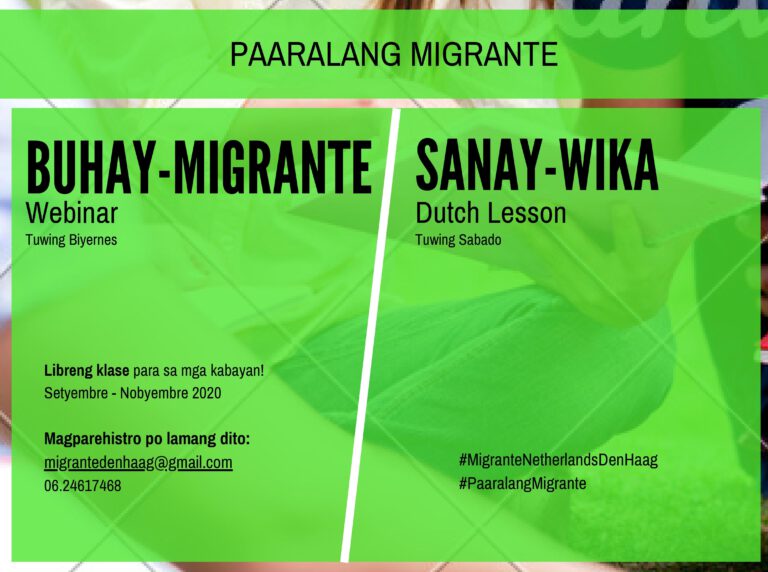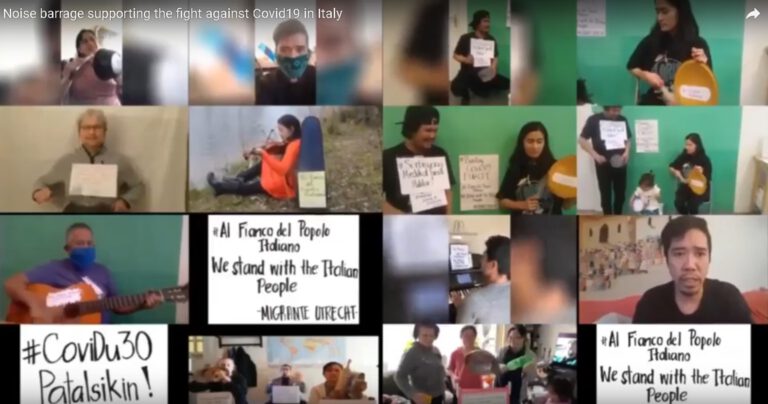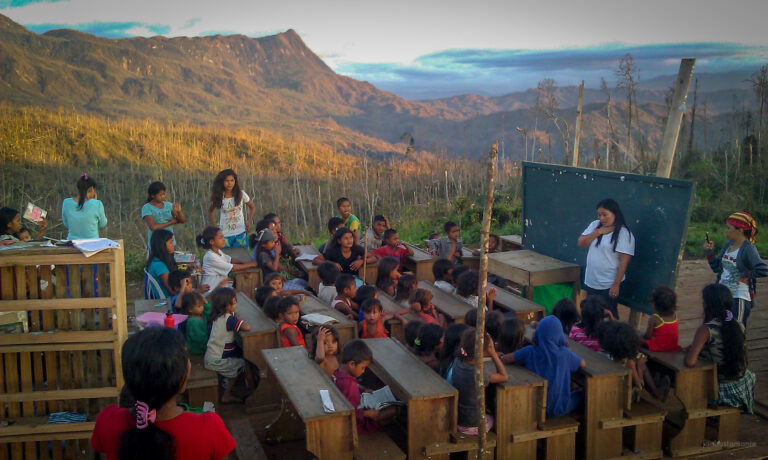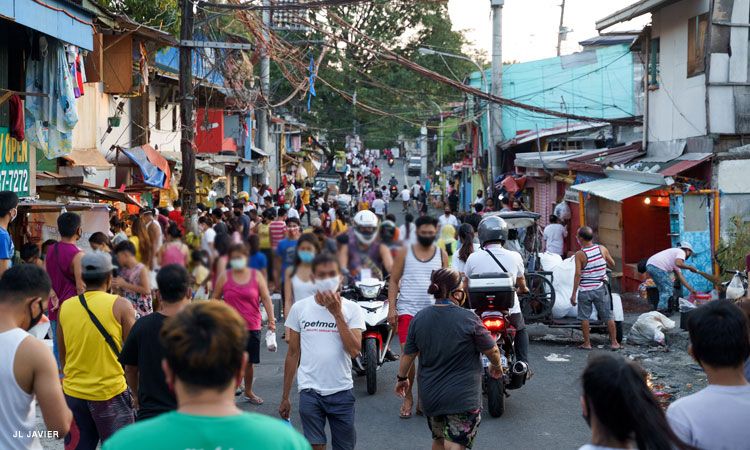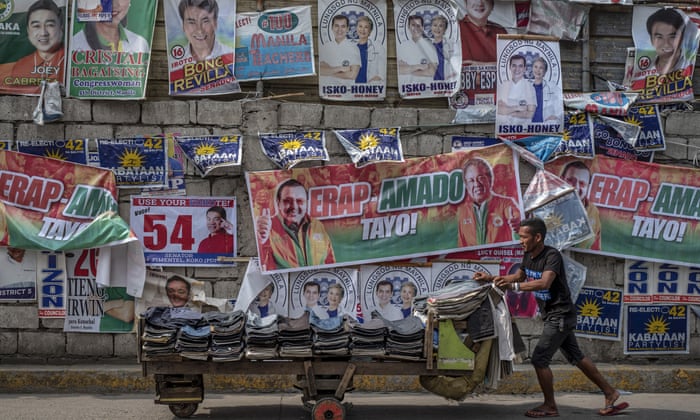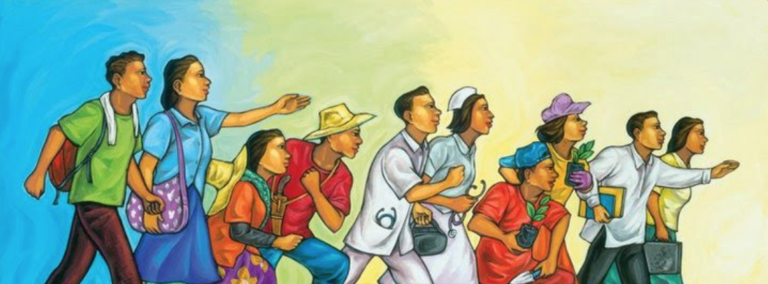Patuloy na tinataguyod ng Migrante Netherlands Den Haag ang Paaralang Migrante para sa lahat ng interesadong kababayan sa Netherlands. Tampok sa paaralan ang mga serye ng pag-aaral tungkol sa mga isyung umaalburoto sa buhay ng mga Filipino. Tampok rin ang unang pagsasanay para sa wikang Olandya.
Ikaw ba ay interesado? Magparehistro po lamang dito: http://bit.ly/PaaralangMigranteRegistration
***
School for Filipino Migrants: Talk Politics, Learn Dutch
Migrante Netherlands Den Haag continues to provide free online classes for Filipino migrants in the Netherlands through its initiative, Migrante Netherlands Academy. The school offers a series of webinars about the issues and concerns affecting the lives of Filipino migrants. It also offers Dutch lessons for beginners to help capacitate Filipinos for work, study and social rights claims.
Interested? Register here: http://bit.ly/PaaralangMigranteRegistration
Paaralang Migrante: Talk Politics, Learn Dutch
Lumad children value their education
The mountainous countryside of Mindanao, Southern Philippines is home to the indigenous Lumad communities whose lives are constantly threatened by militarization and state-sponsored attacks. Through sheer determination and with the help of non-governmental organizations, they were able to establish their own schools for the education of Lumad children based on a homegrown curriculum that respects and promotes their indigenous rights and way of life. Today, many of these Lumad schools have been forcible closed as nearby communities evacuate their homes to flee from continuing threats, harassments and killings.
Angel May’s “comfort zone”
Seventeen-year old Angel May, a Moro-Obo Manobo student from Mindanao Interfaith Services Foundation, Inc. Academy (MISFI Academy) in North Cotabato, Mindanao, finds comfort in her everyday routine of activities at her boarding high school.
At 3:00 in the morning, she wakes up to take a bath and prepare herself for the day. Angel May and her groupmates then cook breakfast for their other classmates who are either tasked to clean the dormitory building and its surroundings or feed the chickens and other animals in the school’s livestock. After the food is cooked, the dorm cleaned and the animals fed, Angel May and her peers proceed to tend their school garden farm where they grow vegetable crops like squash, okra, eggplant and gourd. Most of the fresh produce that they harvest go to the school’s pantry and food stockpile to ensure that they will have consumables for the next day. Any excess will then be sold at a reasonable price to residents living near the school.
At around 6:00 in the morning, the students share a simple breakfast, usually steamed rice and a vegetable dish, that Angel May and her groupmates had cooked earlier. Their stories about the previous day’s lessons or today’s expected activities would fill the dining hall as they eat communally. For Angel May, this is the single important moment that gets her excited, to start the day she knows will be full of new things to learn.
After breakfast, the students hurry to the open field for the flag raising ceremony which starts at around 7:00. Classes then start at 7:15 and end until 5:00 in the afternoon, with an hour lunch break at noon. Angel May, being a senior high school student, has classes on Physical Sciences, Agriculture, Creative Writing, Oral Communication, Cultural Studies, Physical Education and Health, among others.
The bell’s ringing in the afternoon signals the end of classes. It also means another activity – Angel May and the other students will go back to the school garden farm. By working in the garden farm, they are able to apply the different lessons on scientific farming and food production that they have learned inside the classroom.
The students then retreat to their dorm rooms to rest after a long day’s work. They eat dinner together and the endless stories once again reverberate inside the common dining hall. Before calling it a night, they work on their assignments or study in the library. By 9:00 in the evening, they all have to settle down to sleep as the school dormitory’s policy of lights off is strictly observed.
On some days, Angel May and her co-students go outside the campus and provide the surrounding communities with basic health services such as blood pressure monitoring for the elderly, discussion on health and sanitation and simple diagnosis of common illnesses. Healthcare from the government seldom reaches these far-flung communities, if at all. That is why the school’s health program extends itself to the community. This also serves as the students’ practicum – enriching their knowledge with actual practice supervised by their teacher who is a licensed nurse. With herbal medicines they themselves made, they are able to provide medicines to community members who are inflicted with simple illnesses like cough and flu or skin diseases that are pretty common in the community. Grade 12 students are also being taught how to handle minor surgical operation procedures such as circumcision and cyst-removal operation. There are also lessons in acupuncture and other oriental medical healing.
In the rare occasion that Angel May gets to go home and visit her parents, usually during semestral breaks and the holidays, she surprises them with how much knowledge she has already acquired through attending the MISFI Academy. And even though being away from home for a long time has its downside, for Angel May this is a small sacrifice not only to help her family break away from the chains of illiteracy, but also to empower her whole community in claiming their right to self-determination and development.
A beacon of hope
Like Angel May and many other Lumad youth, Bandam, a 15-year old Manobo, greatly values his education. He is currently a second year student at the Alternative Learning Center for Agriculture and Development (ALCADEV) in Surigao del Sur, Mindanao.
Bandam is grateful he gets to study in ALCADEV where he is being developed holistically – as a proud member of his tribe who contributes to the development of the whole community towards self-reliance and sufficiency. According to him, his fellow tribesmen did not have the same opportunity in the past.
Before ALCADEV and similar schools were established, Manobo children had to walk 16 kilometers to the nearest government-run school every day. Parents also had to provide for the school expenses for food, mandatory contributions and school projects. If those were not enough to hinder many of these children to go to school, they also face discrimination from non-indigenous children and even some of the teachers. Being poor, they do not have the luxury of new, let alone nice, clothes. There is also the language barrier. These result to teasing and bullying, which then result to discouragement in pursuing their studies. Students graduating from high school were a rare occurrence in their community.
Illiteracy among the Manobos and other Lumad groups has further made them vulnerable to exploitation. Bandam recalled, as told to him by elders of his tribe, that in the past, landgrabbers tricked the Manobos into selling tracts of their ancestral land in exchange for a single can of sardines. Greedy merchants buy their produce at much lower prices than what it actually cost. On the other hand, the basic necessities they buy from the market are overpriced. Unable to earn a decent income, schooling for the Manobo families was next to impossible. This was a vicious cycle that stunted the social, economic and cultural development of the Manobos for years.
Through the collective effort of parents, community leaders, non-governmental organizations and faith-based groups, schools like ALCADEV were established in Surigao del Sur, Mindanao. Bandam, along with his fellow Manobos, are now able to study in a school that is very much accessible to their communities without having to worry about financial constraints as everything in the school is free.
The Manobos and other Lumad groups rely on their ancestral land and the natural surroundings as their primary source of livelihood. That is why all ALCADEV students are being taught scientific knowledge and technologies about agricultural and livestock farming.
Like Angel May, Bandam, along with his classmates, also get to put into practice what they had learned as they tended to the school’s garden plots every morning and afternoon. They also learn how to make organic fertilizers and make use of vermiculture. As a result, they were able to cultivate and harvest bountiful, organic and healthy fruits and vegetables. They also learn to make use of herbal medicines to treat common illnesses instead of going to the pharmacies in urban centers which was costly to them.
The school’s efforts did not go unnoticed. Local government officials have extended to ALCADEV their appreciation for bridging the gap in providing education to the Manobo communities. In 2014, the Literacy Coordinating Council – Department of Education awarded the school as the Most Outstanding Literacy Program in the region and 5th Most Outstanding Literacy Program in the Philippines.
But perhaps the most important recognition the school has ever received came from the Manobo people themselves. It is the students’ will to study well, as evident in the community’s collective action to sustain its operation.
Lumad schools under attack
Recently, however, it is not Angel May and her classmates that can be seen inside the classrooms. For months now, soldiers of the Armed Forces of the Philippines have occupied their school as well as many others all over Mindanao.
The Philippine authorities want schools like MISFI Academy and ALCADEV closed down. According to them, these schools are training grounds for rebels and should not be allowed to operate. They utilize the armed forces in initiating smear campaigns against the Lumad schools. A growing list of reported and documented human rights violations against the students, teachers and community members also points to the military as perpetrators.
The communities in which these schools are operating have long been resisting the intrusion of various development aggression projects such as mining and agribusiness plantations. The Lumads know that once these supposed development projects were given the greenlight, it would mean the end of their way of life as they know it. Eviction from their ancestral lands will be widespread. The destruction of natural resources will be inevitable.
Because of the strong resistance of the students and teachers of Lumad schools, as well as whole communities, they are being subjected to human rights violations. Multiple reports of military encampment in schools and other public places have been reported since 2009. The threats and intimidation suffered by Lumad communities have escalated to enforced disappearances and killings. Bandam recalled that in 2015, his whole community bore witness to the killings of their school administrator and two tribal leaders. Children and adults alike were made to watch the assassination to instill fear among the community. Schools are being burned down to the ground.
Administrations, past and present, have done nothing to stop these atrocities. In 2013, the national ministry for education issued a memorandum order that further gave license to the military’s presence in schools, a clear violation of international humanitarian laws. In addition, many of the schools’ permits to operate have been revoked or withheld by the education ministry. Even President Rodrigo Duterte, in his 2016 state of the nation address, threatened to bomb Lumad schools should they continue to operate.
Instead of cowering to the military and authorities, Angel May and her community, along with other Lumads all over Mindanao, journeyed to the country’s capital to share their stories and gather support from the general public. But even if they are seeking refuge, the Lumads believe that the education of their children should not be compromised. Thus the Lumad Bakwit School (Lumad Evacuation School) was born. Schools and some universities in Metro Manila have provided classrooms where the Lumads can hold their classes. Donations of schools supplies, food and other necessities have poured in to sustain the operation of the school. Teachers and students from Manila also teach special topics from time to time.
The Lumad Bakwit School is in itself a form of protest. It is the Lumads showing their strength in unity and resilience in the face of attacks against them as people. It has, thus far, gathered huge support, both locally and internationally, providing the Lumads with reinforced strength to struggle for education and their rights.
Hope lingers
Angel May is very grateful they are able to continue with their studies even though they were forced to leave home. That despite the terrible things that are happening to them, the support and solidarity they are receiving are more overwhelming. But some days they also battle with homesickness. They cannot help but yearn for the simple life they have back home.
Bandam, after a brief support-visit to the Lumad Bakwit School in Manila in December 2019, is now back at Alcadev. He feels very deeply for Angel May and the other Lumad students who had to continue their education while in evacuation in the cities. He finds himself fortunate to continue breathing the fresh air of the countryside while continuing his studies. But he knows very well that all of these are possible only while they can continue to resist military occupation in their community. Bandam does not lose hope for the other students.
Despite her worries and fears, Angel May remains steadfast in her people’s will to defend their school. She draws inspiration from her fellow classmates and the future generation of students to continue on with their struggle. She may have left her ‘comfort zone’. But she believes that with the help of concerned individuals, she would be able to reclaim it.
-end-
Many thanks for your support, Call for solidarity to fight the virus is still running
The call for solidarity has already raised € 2,850. Touchingly beautiful! Many thanks to the generous donors. If other people wonder if it is still possible to donate – yes, it is still possible. Every support is urgently needed!
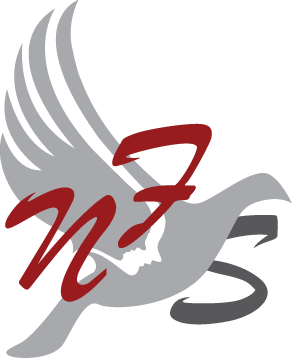
We do this work from the Dutch-Philippine Solidarity Movement to care for each other and care for the people in the Philippines. People all over the world are affected by the corona crisis. Also, or rather now, people in developing countries deserve our attention and we focus on the Philippines. Reports reach us: If the virus doesn’t kill us, then hunger and poverty will.
Most developing countries are currently only at the beginning of the epidemic and do not have a high-quality health care system, good water pipes or a stable food supply. The national governments in those countries will undoubtedly release emergency aid budgets, but will they end up with the people living at the bottom of society?
Our appeal is to support Direct, a division of CDRC (disaster relief) in the south of the Philippines. Immediately has a good track record in helping people affected by earthquakes and typhoons and they have a program of clean drinking water and food security in the interior. In this crisis, the focus is on corona prevention and on the immediate needs of people. People are under house arrest and many are out of work, so no income and no food.
If others want to make a donation, you can do so on NL76INGB0008118425 in the name of. NFS, stating “Reduce virus”
The following articles show that emergency aid budgets do not (yet) end up with people who live at the bottom of society:
https://www.onenews.ph/human-rights-groups-covid-19-crisis-not-an-excuse-to-stifle-dissent-criticism
The promised food and money aid finally came the day after the violence broke out
https://verafiles.org/articles/hunger-does-not-know-social-distancing
Wala kaming utang na loob sa inyo; Paunawa sa mga halal na opisyal
Hango mula sa facebook
Hindi namin kayo pinakiusapang kumandidato sa halip ay kayo ang nakiusap sa amin na iboto kayo at iluklok sa pwesto.
Noong kayo ay kumakatok sa mga bahay namin para humingi ng aming boto, kayo ay nangakong magseserbisyo sa amin, ipaglalaban at pangangalagaan ang aming mga karapatan, tutulungan kami sa panahon ng mga sakuna at kalamidad.
Ngayon pong binawalan ang mga tao na makalabas ng bahay at makapagtrabaho, may kaya man o mahihirap, lahat ay nalagay sa alanganing sitwasyon. Lahat po ay natigil ang kabuhayan maliban sa iilan na nabibilang sa mga industriya na tinatawag na esensyal.
Tayo po ay papasok na sa ikatlong linggo ng quarantine at lahat ay NAKAKARAMDAM NA NG KAGIPITAN maliban na lamang sa iilan na totoong nakatataas ang kalagayan sa buhay. Ang mga working class ay nauubusan na rin ng pambili ng mga pangangailangan.
Kaya mga pinagpipitagan naming opisyal, ‘wag nyo pong iparamdam na NANGHIHINGI ang inyong nasasakupan. Wag nyo pong ipamukha na kami ay naghihintay at umaasa sa inyong 2 kilong bigas, ilang delata at ilang noodles.
Ang gusto lamang naming makita at maramdaman ay ang TAOS PUSO ninyong pagdamay sa amin na maaaring gawin hindi lamang sa pamamagitan ng pagbibigay ng relief goods.
Wag po kayong umastang parang napipilitan lamang. Wag po kayong umaktong parang may utang na loob kami sa inyo.
Kayo bilang mga halal na opisyal ang nakiusap na ipwesto namin kayo sa inyong kinauupuan ngayon. Kayo ang nagprisintang maging lider namin.
Ibigay nyo ang tulong na nararapat PARA SA LAHAT nang walang kinikilingan. Wag nyo ring ibuhos lamang ang tulong sa mga bumoto sa inyo.
Gumaya po sana kayo sa mga masisipag na opisyales ng ilang lugar sa bansa na ngayon ay lalong napapamahal sa taumbayan dahil nakikita hindi lamang ng kanilang nasasakupan kundi maging ng buong bansa ang kanilang husay at dedikasyon sa pagseserbisyo publiko.
Pakatandaan na ang itinutulong nyo ay hindi galing sa bulsa ninyo kundi sa ibinubuwis namin o kaya naman ay galing sa mga pribadong indibidwal at grupong ang adhikain ay makatulong din sa bayan ngayong panahon ng pangangailangan.
Kami po ay nagmamasid at nangangakong pakatatandaan ang lahat ng ginagawa nyo. Ang isang buwan na ito ng quarantine ay magsisilbing EYE OPENER sa mga botanteng nagkamali sa pagpili SAINYO??✌.
SALAMAT PO.
#Halalan2024 #ENHANCEDCOMMUNITYQUARANTINE #STAYHOMESAVELIVES #FIGHTAGAINSTCOVID19 #COPYPASTE #CTTO #COVID19PH #coronavirus #DuterteVirus
Pabatid sa lahat ng kababayan kaugnay ng COVID-19
Para sa: Lahat ng kasapian ng Migrante Netherlands Den Haag at sa buong Filipino community sa Netherlands.
Mga kababayan, alam na natin ang mga kaganapang dulot ng Corona virus o COVID 19. Dito sa Netherlands ay patuloy na tumataas ang bilang ng mga nahahawaan ng sakit na ito. Kaya naman ang ating organisasyon ay nakatutok din sa mga balita at sa mga kaganapan. Anumang impormasyon ay mabilis nating ipinapaabot sa atin chat group. Ating alagaan ang ating kalusugan para na rin sa ating mga pamilya na nasa Pilipinas na umaasa sa atin.
Sa kasalukuyan, inirerekomenda ng Migrante Europe, at Migrante Netherlands Den Haag sa mga Overseas Filipino Workers (OFW) sa Europe ang mga sumusunod:
1. Iwasan ang kontak sa mga maysakit.
2. Iwasan ang paghawak sa mata, ilong at bibig kung di nakapaghugas ng kamay.
3. Ugaliing maghugas ng kamay ng tubig at sabon ng di bababa sa 20 segundo o kaya ay gumamit ng hand sanitizer na may 60-95% alcohol. Gumamit ng sabon at tubig kung may nakikitang dumi sa kamay.
4. Siguraduhing malinis ang kamay matapos gumamit ng banyo, bago kumain, matapos umubo, bumahing o kaya ay suminga.
5. Bantayan ang sariling kalusugan.
6. Maging mapagbantay sa paalala at payo hinggil sa kalusugan sa inyong lugar.
Kung ikaw ay nasa isang lugar kung saang mayroon nang naulat na nahawa sa Covid-19 virus at may karamdamang lagnat, pag-ubo at nahihirapan sa paghinga, gawin ang mga sumusunod:
1. Kunin ang inyong temperatura.
2. Kumuha ng payong medikal. Tumawag muna sa opisina ng doktor or kaya ay emergency room sa inyong lugar. Ilahad sa kanila ang inyong mga biyahe at address ng lugar na tinitirhan na may naiulat na may kaso ng Covid-19 virus, at ang iyong mga sintomas.
3. Iwasan ang kontak sa ibang tao.
4. Huwag bumiyahe kung may karamdaman o sakit.
5. Takpan ang inyong bibig o ilong ng tissue o ng iyong sleeve (hindi ng kamay) kapag umuubo o bumabahing at suminga
6. Maghugas ng kamay na gamit ang sabon at tubig ng di bababa sa 20 segundo or kaya ay gumamit ng hand sanitizer na may alcohol mula 60-95% matapos umubo, bumahing o suminga. Gumamit ng sabon at tubig kung makitang marumi ang kamay.
7. Kung may kakaibang nararamdaman agad tumawag sa RIVM 0800-1351.
8. Makipag-ugnayan sa ating mga opisyales ng ating organisayon.
Maraming salamat.
Cora Espanto, Chairperson
Virgie Lozada, Vice-Chairperson Internal
Marlon Toledo Lacsamana, Vice-Chairperson External
Rachel Steinebach, Treasurer
Mharee David, Secretary
Rosalie Detras Jonker, Auditor
Para sa ibayong katanungan, mag-email sa [email protected].










